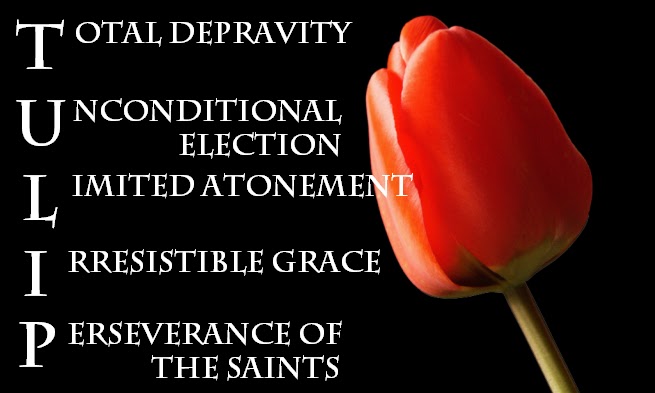Growing up, I was introduced to Calvinism. A theological belief system within Christianity, Calvinism was founded by John Calvin, a Protestant Reformer. Calvin's teachings can be summed up in the following acronym
Total depravity
Unconditional election
Limited atonement
Irresistible Grace
Perseverance of the Saints
...or, TULIP.
Now, one doesn't often think of Calvinism as being much of a part of Evangelicalism. However, it certainly is part of Christian culture, and had a negative impact on me and my young life. At the age of 12, I was introduced to Calvinism via sermons like "Sinners in the Hands of an Angry God" and books by R.C. Sproul. It focuses mainly on God's own choice and a lack of free will.
It would take me several blog posts to go over each point of TULIP, so I will simply explain: according to Calvinism, God made a choice: he chose what came to be known as "the elect." From the foundation of the world, God chose who would respond to salvation, while passing over others. Those who are "elect" will turn to God, not of their own doing, but because God chose them. Those who were not chosen are reprobate and "vessels fitted for destruction" and have no hope of heaven, no matter how they may try.
As if this were not bad enough, not only are the reprobate predestined to hell, but at the end of the world, when all the elect are in heaven, they will look down on those in hell in pleasure, rejoicing over seeing such power and majesty. This is called the abominable fancy, and is attested by many Protestant, even Catholic theologians, such as St. Thomas Aquinas, and other early Christians, such as Tertullian.
It doesn't take a rocket scientist to figure out that such odious theology breeds abuse and power struggles. The theology of an abusive God will no doubt lead to an abusive man. For what kind of a God would purposefully make a person evil, then condemn them for being what they were created to be?
In my view, of all the theological belief systems within Christianity, Calvinism is the most dangerous. It teaches its followers an "us vs. them" theology and glories in the idea of an almost snuff film paradise where the "blessed" look up the tortured souls of hell, and rather than pity them, for being reprobate and damned eternally by God...they rejoice and enjoy the view.
So, for the sake of healing, I created my own acronym, the anti-TULIP if you will: APHRODITE. Named after the Greek goddess of love, it's all about self-love and acceptance of who we are; not depraved monsters, but wonderful miracles of the universe itself.
A: Accept yourself for who you are
P: Progress, not perfection
H: Healing is a process
R: Remember you are stardust
O: Often, practice self-love
D: Do your best to show kindness to yourself and others
I: Ignite the fire of passion and compassion within your heart
T: Take yourself to new heights
E: Engage in unapologetic joy
Maybe not perfect: but, perhaps APHRODITE is our way of healing ourselves, the people around us, and the world.


